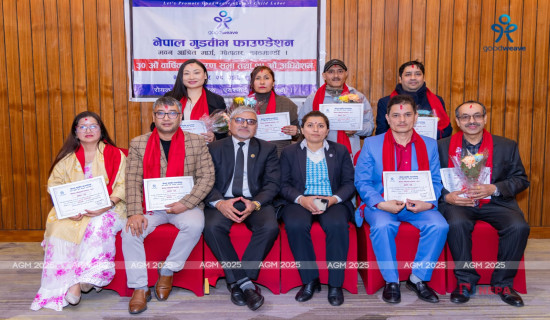- Sunday, 14 December 2025
Power Of Meditation
Meditation, as defined by the US Department of Health and Human Services, is a mind-body practice with diverse benefits. It promotes calmness, relaxation, psychological balance, and overall well-being. It involves the interaction of the brain, mind, body, and behavior. Meditation has ancient roots, spanning various cultures and religions. Though techniques and goals vary, its core aims for heightened awareness, mindfulness (Chetana), inner peace (Samadhi), and ultimately salvation (Moksha). Regular practice improves cognitive functions like attention and concentration. Scientifically proven, meditation effectively reduces stress.
Harvard University, School of Medical Science, defines stress as a set of physiological and psychological reactions that the body and the brain have when facing a threat or a challenge, known as the fight or flight response, a term coined by Dr. Walter Bradford Cannon, a professor at Harvard Medical School.
The fight or flight response prepares our body to either confront or escape the danger. It reflects the two primary choices our ancestors faced when confronted with a threat: confront the danger head-on, fight, or flee to escape from it—flight.
According to Dr. Cannon, the stress response releases hormones such as cortisol and adrenaline. These hormones increase the heart rate, blood pressure, breathing rate, and muscle tension, among other effects. The stress response can be helpful in short-term situations, but if it is prolonged or repeated, it can have negative impacts on health and well-being. Whenever we receive a life-threatening situation, a part of the brain called the amygdala becomes active. It is a region of the brain that is involved in processing emotions, particularly fear.
Our emotions guide our actions by reflecting our environment. They alert us to potential dangers, prompting protective responses. However, emotions aren't always reliable indicators of threats, sometimes leading to unnecessary anxiety and stress.
Susan Spinks, a meditation teacher at the Sydney Institute of Meditation, states that, as we evolved, a rustle in the grass could be a dangerous wild animal or a hostile person from another tribe. The stress response is what has kept mankind alive; it has been key to our survival.
Today, most of us do not usually face these situations. However, the evolution of our brain has not kept pace with the rate at which our lives are changing. The amygdala is constantly misinterpreting information entering the brain as well as what we are thinking. It detects threats that are not there. This can arise during relationship problems, money worries, difficult living conditions, work issues, or certain events. Even a difference of opinion with someone is enough to trigger it.
While the fight-or-flight response is crucial for survival in certain situations, chronic activation of this stress response, especially in response to non-life-threatening stressors, can have negative health consequences. Prolonged exposure to stress hormones can contribute to various health issues, including cardiovascular problems, weakened immune function, and mental health disorders. Techniques such as meditation and relaxation exercises are often employed to help counteract the effects of chronic stress and promote overall well-being.
According to Spinks, within a few meditation practices, the physiological response of the body is the opposite of the stress response. The levels of cortisol and adrenaline in the body reduce, breathing slows and becomes deeper, the heart rate reduces, and the intelligent part of the brain has a better chance of working to its optimal capacity. The amygdala also shrinks over time with regular meditation. This means that when the stress response is triggered, it is less intense and much shorter-lived.
Meditation teachers, neuroscientists, and psychiatricians administer various techniques to heal the traumatic states of people. Out of such many techniques, mindfulness-based interventions (MBIs) are a type. These are a combination of psycho-therapeutic techniques like meditation, relaxation, and others to promote mindfulness, which is the practice of paying attention to the present moment in a non-judgmental way. MBIs have been shown to be effective in treating a variety of mental health conditions, including depression, anxiety, and stress.
A recent review of studies published in the Journal of the American Medical Association's (JAMA) Internal Medicine found that MBIs were effective in reducing symptoms of depression and anxiety in adults. The review also found that MBIs were more effective than other types of psychotherapy, such as cognitive-behavioural therapy (CBT), in reducing symptoms of depression.
A study in JAMA Psychiatry revealed that mindfulness-based interventions (MBIs) effectively prevent depression relapse post-treatment. Participants in MBI programmes showed lower relapse rates compared to non-participants. MBIs offer a safe and efficient approach for various mental health conditions, often conducted in group settings or individually at home. The American Psychological Association endorses mindfulness meditation for its dual benefits for mental and physical health. Mindfulness-Based Stress Reduction (MBSR) and Mindfulness-Based Cognitive Therapy (MBCT) are notable interventions. MBSR involves weekly and daily mindfulness practices, including yoga and meditation, while MBCT combines MBSR and cognitive-behavioural therapy for depression treatment.
Researchers reviewed more than two hundred studies of mindfulness among healthy people and found mindfulness-based therapy was especially effective for reducing stress, anxiety, and depression. Mindfulness can also help treat people with specific problems, including depression, pain, smoking, and addiction. Some of the most promising research has looked at people with depression. Several studies have found that MBCT can significantly reduce relapse in people who have had previous episodes of major depression. Mindfulness-based interventions can improve physical health, too. For example, mindfulness may reduce pain, fatigue, and stress in people with chronic pain. Other studies have found preliminary evidence that mindfulness might boost the immune system and help people recover more quickly from a cold or flu.
Chronic stress can impair the body's immune system and make many other health problems worse. By lowering the stress response, mindfulness may have downstream effects throughout the body.
Psychological researchers have discovered that mindfulness affects two distinct stress pathways in the brain, altering brain structures and activity in areas linked to attention and emotional regulation. Through a review of meditation studies, they identified the specific components of mindfulness responsible for its positive effects. Findings indicate that individuals undergoing Mindfulness-Based Cognitive Therapy (MBCT) exhibited reduced tendencies for negative thoughts or unhelpful emotional reactions durin g stressful situations. Moreover, participants in MBCT, or Mindfulness-Based Stress Reduction (MBSR), demonstrated enhanced present-moment focus and reduced repetitive negative thinking.
Mindfulness meditation changes our brain and biology in positive ways, improving mental and physical health. This meditation involves training our attention to focus on the present moment and observing our thoughts and feelings without judgment. This can help interrupt the stress cycle and allow us to respond more calmly and effectively to stressful situations.
Strategies such as ignoring or denying stress, though momentarily effective, can detrimentally impact long-term health and happiness. Research from the Journal of Research in Personality reveals that mindfulness, particularly present-moment awareness, enhances stress resilience and coping skills.
Present-moment awareness entails focusing on the current experience rather than fixating on future outcomes or past events. Studies suggest that individuals embracing present moment living enjoy various health advantages, such as reduced stress, anxiety, and depression, elevated mood, and enhanced overall well-being.
(Ojha, a PhD in communication, is a meditation teacher.)
















